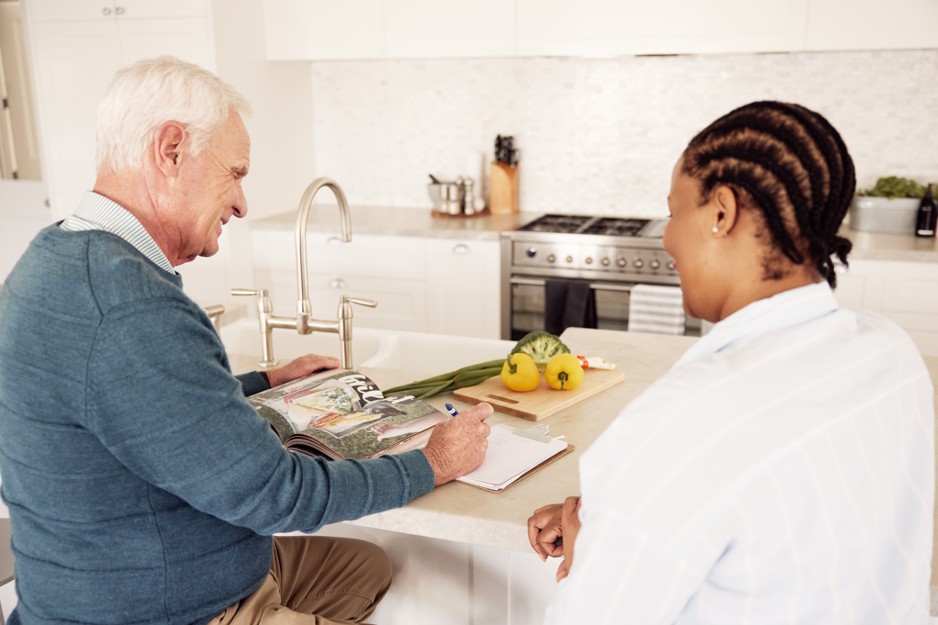Summer is just about here, and these warmer months unfortunately bring the increased risk of dehydration, especially for older adults. Dehydration happens when someone loses more fluids than they take in and there is not enough water in the body. Older adults are at greater risk of dehydration and its complications such as confusion, delirium, low blood pressure and dizziness, which can increase the risk of falls. Dehydration can also cause constipation and increases the risk of urinary tract infections, it could also cause kidney injury or failure. Making sure that older adults stay hydrated and keep cool is critical, especially during these summer months, here are some tips to help prevent dehydration.
- Make it as easy as possible for people to have a regular drink by making sure there is always a drink available, ensure it’s in close proximity, with a straw if that helps.
- Offer fluids often throughout the day; consider doing so on a schedule.
- Offer smaller quantities of fluid more often; older adults may be reluctant to drink larger quantities in one sitting.
- Regularly offer drinks that they enjoy, even caffeinated drinks such as tea, coffee will still help with hydration. Fruit or herbal teas are another good idea that can be served hot or cold, iced coffee is a great summer option.
- Leave notes or reminders around if someone lives alone, when visitors arrive enjoy a drink together.
- If plain water is not appealing to someone try adding a splash of cordial or fruit juice or try coconut water as an alternative.
- Other ways to make a drink more appealing is by adding fruit - berries, melon, cucumber. Adding Ice or freezing strawberries, slices of lemon or other fruit instead of ice.
- Try to include water-rich food in meals, e.g. soups, stews, salads, sauces, yoghurt, and fruit salads.
- Encourage fruit and vegetables as snacks e.g. Oranges, apples, watermelon, grapes, berries, cucumber and tomatoes.
- Ice cream or yoghurt are other great options on their own and can also be made into smoothies with fruit, water or juice.
- Homemade ice blocks with fruit, yogurt or diluted juice is another option if some one isn’t keen on drinking much.
- Jelly is great option, this can have fruit added to it. If sugar intake is an issue you can make it with sugar-free jelly, or lower the sugar by making it yourself using gelatin powder and fruit juice.
- Sucking on ice chips can also be refreshing and this is a good water replenishment.
- Identify any continence concerns that may be making the older person reluctant to drink.
- Consider a timed toilet approach, which means helping the older person get to the bathroom on a regular schedule. This can be very helpful for people with memory problems or mobility difficulties.
As well as encouraging regular fluids ensure your loved ones home is kept cool, open windows for airflow, use fans if they have them, draw curtains to keep afternoon sun out of certain areas of the home that get too warm. Upstairs areas can get particularly hot, especially if not used regularly, if possible open upstairs windows to allow airflow.
It is also important to ensure older adults are wearing appropriate clothing for the weather, in particular those with Dementia may not recognise the heat and dress in a number of layers or inappropriate clothing. Wearing loose clothing that is made from light, breathable fabric and that is white or light-coloured is recommended.
Keep an eye out for signs of dehydration which include:
- Dry mouth and tongue
- Headache
- Muscle cramps
- Dizziness
- Weakness, sleepiness or lethargy
- Irritability, Confusion, Delirium (new or worse-than-usual confusion)
- Less frequent urination
- Dark-coloured urine
- Constipation
- Sunken eyes
- Low Blood Pressure
It is important to remember that the presence or absence of these physical signs are not always reliable ways to detect dehydration. Furthermore, the physical symptoms above can easily be caused by health problems other than dehydration so it is important to see a GP if you have any concerns.
*Health central. 2019. Hydration – Why is it so important for Older People?
*Eldernet Gazette. 2018. Watching for Dehydration in the Vulnerable Elderly


